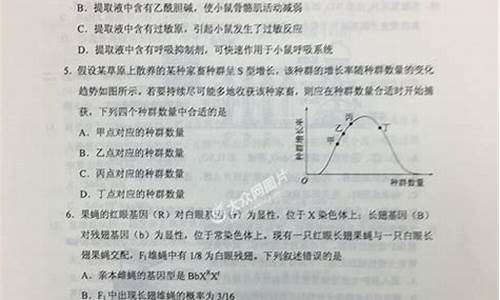您现在的位置是: 首页 > 教育政策 教育政策
2014高考虚拟语气真题答案,2014高考虚拟语气真题
tamoadmin 2024-05-19 人已围观
简介虚拟语气在条件句中的用法:条件句有真实条件句和虚拟条件句两种。真实条件句所表示的假设是有可能发生的,此时主句不用虚拟语气;而虚拟条件句则表示一种假想,与事实相反或不大可能会发生,此时用虚拟语气。如:If I have time,I will go. 假若我有时间,我就去。 (陈述语气) If I were you,I would go. 假若我是你,我就去。 (虚拟语气 ) 时态类型 主句谓语

虚拟语气在条件句中的用法:
条件句有真实条件句和虚拟条件句两种。真实条件句所表示的假设是有可能发生的,此时主句不用虚拟语气;而虚拟条件句则表示一种假想,与事实相反或不大可能会发生,此时用虚拟语气。如:
If I have time,I will go. 假若我有时间,我就去。 (陈述语气) If I were you,I would go. 假若我是你,我就去。 (虚拟语气 ) 时态类型 主句谓语形式 条件句的谓语形式 例句 与现在事实相反 would/should/could/might+ V原形 动词过去式 did
*be 多用were 1. If I were you, I should study English.
2. I would certainly go if I had time. 与过去事实相反 would/should/could/might + have done 动词过去完成式
had done 1. If you had taken my advice, you would not have failed in the test.
2. If I had left a little earlier, I would have caught the train. 与将来事实相反 would/should/could/might + V原形 ①动词过去式
②should +V原
③were + to do 1.If you came tomorrow, we would have the meeting. ①
2. If it were to rain tomorrow, the meeting would be put off.③ *规律总结:从句都往过去推一个时态,如:与现在相反的if从句就用过去时;与过去相反用过去完成时(即过去的过去)
注:特别说明
1、l would/should/could/might主句谓语中的should主要用于第一人称后;would表示结果还表示过去经常常常做某事,might表示可能性,could表示能力、允许或可能性。比较:
If you tried again ,you would succeed. 要是你再试一试,你就会成功的。 (would表结果)
If you tried again, you might succeed. 要是你再试一试,你可能会成功的。 (might表可能)
If you tried again ,you could succeed. 要是你再试一试,你就能成功了。(could表能力)
2、错综时间虚拟条件句 即条件从句与主句所指时间不一致,如从句指过去,而主句即指的是现在或将来,此时应根据具体的语境情况,结合上面提到的三种基本类型对时态作相应的调整:
If it had rained last night, the ground would be wet now. 要是昨晚下过雨的话,现在地面就会是湿的。
You would be much better now if you had taken my advice. 假若你当时听我的话,你现在就会好多了。
3、If虚拟条件句的否定(含蓄条件句) 常考两个句型:If it weren’t for…和If it hadn’t been for…,其意为“若不是(有)” “要不是”。如:
If it weren’t for water, no plant could grow. 要是没有水植物就无法生长。
If it hadn’t been for your assistance ,we wouldn’t have succeeded.
=But for your assistance ,we wouldn’t have succeeded.
=Without your assistance ,we wouldn’t have succeeded.如果没有你的帮助,我们不会成功的。
4、If虚拟条件句的倒装形式,即把were, had, should置于句首。例:
Were I in school again (= If I were in school again), I would work harder.如果我能再上一次学,我会学习得更努力。
Had you asked me, I would have told you. (=If you had asked me,…)如果你问我,我会告诉你。
英语动词中一般有三种语气:用来陈述事实的陈述语气;用来表示命令、请求或劝告的祈使语气;还有用来表示与事实相反的假设、愿望、建议的虚拟语气。历年来,体现英语交际功能并能考查学生对对话语境,说话者语气理解能力的虚拟语气相关试题在高考中不断出现。请看下面一些例题: 1. I didn't see your sister at the meeting. If she had come, she would have met my brother.(NMET'94) 2. When a pencil is partly in a glass of water, it looks as if it were broken. (NMET'95) 3. You didn't let me drive. If we had driven in turn, you wouldn't have got so tired. (NMET'96) 4. Should it rain tomorrow, we should have to put off the visit to the Yangpu Bridge. (上海94 ) 由此可见,掌握好虚拟语气很重要。在学习中,学生一向把它列为难度大、形式多样、不易掌握的语法项目之一。同时,虚拟语气考题也是学生易失分的一个方面。其实,虚拟语气主要是考查学生对虚拟语气谓语动词形式的掌握。而虚拟语气动词形式多样,有should+动词原形;有动词用过去式,过去完成时;有would (could,should,might )+动词原形等等。困难就在学生不能清楚记忆什么情况下用哪种动词形式。于是,针对此问题,笔者就虚拟语气动词形式进行研究、分析,摸索出一定的规律,把虚拟语气根据动词形式归类成如下三种。 一、非真实条件句中的虚拟语气形式(即三个公式)。 1.与现在事实相反的。 条件从句主句 动词用过去式(be的过去式一般用were) 主句 would(could,should,might)+动词原形(should只用于主语为第一人称) 例:If I had time now, I would go to the cinema with you. The boy is not hungry. If he were hungry, he would eat the cake. 2.与过去事实相反的。 条件从句 had+过去分词 主句 would(could,should,might)+have+过去分词(should只用于主语为第一人称) 例:If he had been warned, he would not have taken that food. Luckily he was sent to the hospital immediately. We didn't know her address. If we had known it, we would have sent a note to her. 3.与将来事实可能相反的。 条件从句主句 动词三种形式可用:动词过去式should+动词原形were to+动词原形would(could,should,might)+动词原形 例:If it should rain (rained或were to rain) tomorrow, we would have to put off the visit to the Great Wall. [注意]1.虽然有些句中没有明显的if条件从句,而是通过一些介词短语如but for, without或分词短语或副词otherwise等来表示一个含蓄的条件,相当与一个if条件句,这种情况下要注意主句动词虚拟语气形式。例: But for the efforts of the captain , the ship would have sunk. (If it had not been for the efforts of the captain,...) Given more attention, the trees would have grown better. (If the trees had been given more attention,...) I was very busy then. Otherwise I would have helped you with your work. (I was very busy then. If I had not been busy then,...) 2.在虚拟语气中,如果if条件从句有were或助动词should/had,可以把if省略,把were /should /had移至句首,用倒装句。例: If it had not been for the efforts of the captain, the ship would have sunk with all the passengers.可省略if ,把had移至句首,改为: Had it not been for the efforts of the captain, the ship would have sunk with all the passengers. 二、(should )+动词原形的虚拟语气形式。 下列几种情况用(should) +动词原形的虚拟语气形式。 1.在It is natural(important, necessary等)that...句型。例: It is natural that you (should) say apology to him. It is necessary that he (should) be sent to hospital at once. 2.用于表示命令、建议、要求一类动词后的宾语从句,如suggest,order,insist,demand,request,command等。例: The young man insisted that he(should) be sent to do the work. I suggested that we (should) set off earlier. [注意]当insist表示对已发生过的事物的看法,或当suggest为"说明了","暗示"的含义时,从句用陈述语气而不用虚拟语气。 The Arab insisted that he hadn't seen the camel. His smile suggested that he was happy. 当表示命令、建议、要求等名词作主语时,其表语从句也用(should)+动词原形的虚拟语气形式。这类名词有suggestion,request,order,advice,idea等。例: The officer's order was that his soldiers should repair the defence works at once. His advice is that your father should do more exercises in the morning. 上述名词的同位语从句中也应用(should)+动词原形。例: I did not receive the order that you(should) leave here at once. His suggestion that you (should) keep silent is reasonable. 三、谓语动词用过去时(即过去式,过去完成时)的虚拟语气形式。 在wish, would rather, as if, if only等后面的从句,如表示与现在事实相反,其谓语动词用过去式;如表示与过去事实相反,其谓语动词用过去完成时。其中wish后的宾语从句如表示与将来事实相反,谓语动词则用would或could +动词原形;would rather后的宾语从句如表示与将来事实相反,动词仍用过去式;as if引导的从句如表示与事实相符则不用虚拟语气形式。在虚拟语气中be的过去式一般用were。例: -Did you go to the party yesterday? -Yes, but I wish I hadn't. (gone to the party yesterday) I would rather you went next Sunday. I would rather you hadn't done that. If only you had followed my advice. She loves the child as if he were her own. 经过以上归类,学生就能巧记变化多样的虚拟语气形式,从而更好地掌握运用虚拟语气。









